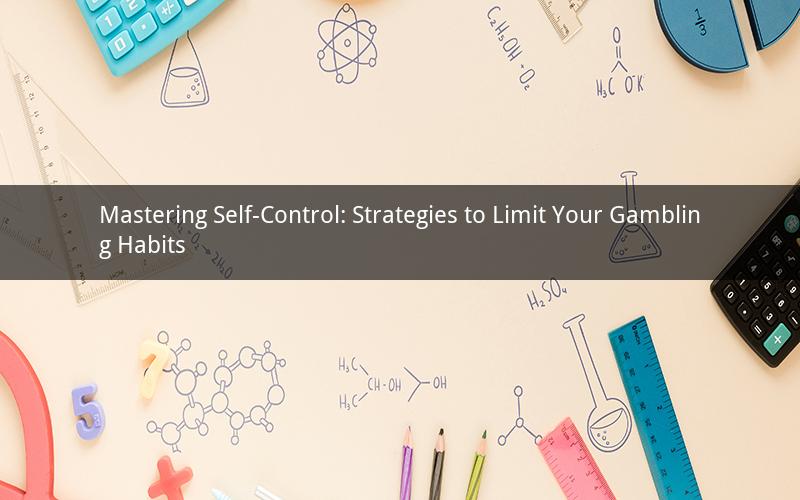
Introduction:
Gambling can be an entertaining and thrilling activity, but for some, it can quickly turn into an addiction. Understanding how to limit your gambling habits is crucial in maintaining a healthy and balanced life. This article delves into various strategies and tips to help you gain control over your gambling behavior and reduce its negative impact.
1. Identify Your Triggers:
To begin limiting your gambling habits, it's essential to recognize the factors that trigger your urge to gamble. These triggers can include stress, boredom, or even social situations. Once you've identified these triggers, you can develop coping mechanisms to avoid giving in to them.
2. Set a Budget:
One of the most effective ways to control your gambling is to establish a budget. Decide on the amount of money you can afford to lose without it affecting your financial stability. Stick to this budget strictly and avoid chasing losses by increasing your bets.
3. Time Management:
Gambling can be an addictive activity, often leading to long sessions. Set a timer to remind yourself to take regular breaks. This can help prevent you from losing track of time and potentially overspending.
4. Find Alternative Activities:
Engage in activities that you enjoy and can provide the same level of excitement as gambling. This can include sports, hobbies, or even trying new experiences. By finding alternatives, you can reduce the urge to gamble and focus on healthier activities.
5. Seek Support:
If you find it challenging to control your gambling habits on your own, seeking support from friends, family, or professionals is crucial. Joining a gambling support group can provide you with a network of individuals who understand your struggles and can offer guidance and encouragement.
6. Avoid Temptation:
Remove yourself from environments that encourage gambling, such as casinos or websites offering gambling opportunities. Limiting your exposure to these triggers can significantly reduce the likelihood of succumbing to your urge to gamble.
7. Monitor Your Behavior:
Keep a record of your gambling activities, including the amount of money spent and the duration of your sessions. This will help you identify patterns and trends in your behavior, allowing you to adjust your strategies accordingly.
8. Practice Mindfulness and Self-Reflection:
Mindfulness techniques, such as meditation or deep breathing exercises, can help you stay grounded and aware of your gambling habits. Regular self-reflection can provide insights into your motivations and help you develop a stronger sense of self-control.
9. Establish Boundaries:
Set clear boundaries for yourself regarding when and how often you can gamble. Communicate these boundaries to friends and family so they can support you in maintaining them.
10. Stay Informed:
Educate yourself about the risks and consequences of gambling addiction. Understanding the potential negative impacts can serve as a powerful motivator to limit your gambling habits.
Frequently Asked Questions:
1. Q: Can I still enjoy gambling if I'm trying to limit my habits?
A: Yes, you can still enjoy gambling in moderation. The key is to set clear boundaries and stick to them. Remember, it's about balancing enjoyment with responsible behavior.
2. Q: How can I overcome the temptation to gamble during stressful situations?
A: Identify healthier coping mechanisms, such as exercise, journaling, or speaking with a friend. These activities can provide relief and help distract you from the urge to gamble.
3. Q: Is it possible to recover from a gambling addiction on my own?
A: While it's possible to recover on your own, seeking professional help or joining a support group can greatly enhance your chances of success. A support system can provide guidance, accountability, and a sense of community.
4. Q: Can I still play lottery games if I'm trying to limit my gambling?
A: Lottery games can be a form of gambling. If you're trying to limit your gambling habits, it's best to avoid all forms of gambling, including lottery games, until you've gained better control over your behavior.
5. Q: What should I do if I think I have a gambling addiction?
A: If you suspect you have a gambling addiction, seek help immediately. Reach out to friends, family, or professionals who can provide support and guidance. Don't wait until the situation worsens.
Conclusion:
Limiting your gambling habits is crucial for maintaining a balanced and healthy life. By identifying triggers, setting a budget, managing your time, seeking support, and finding alternative activities, you can gain control over your gambling behavior. Remember, taking proactive steps towards self-improvement is the key to breaking free from the cycle of addiction.